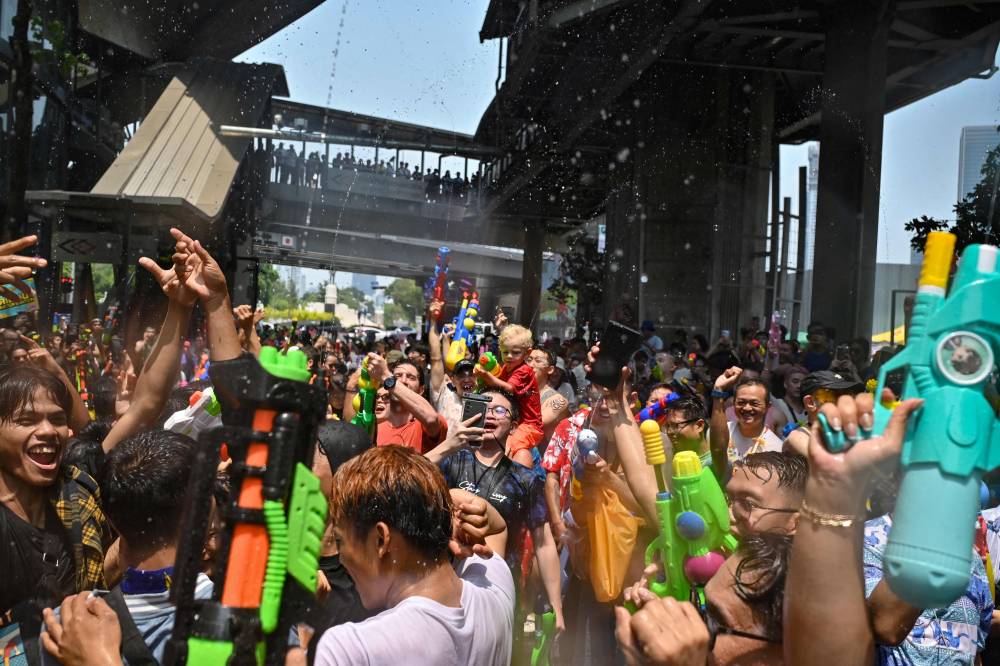Thailand rides on Songkran festival to boost soft power
Known as the Buddhist new year, the holiday was traditionally marked by visiting family members and pouring scented water over Buddha statues.

BANGKOK - Getting drenched in water fights, splashing water with elephants, or enjoying cultural performances, revelers embrace Songkran festivities throughout April across Thailand as the country rides on its traditional new year to boost "soft power."
Songkran, usually held from April 13 to 15 in Thailand, is also celebrated in Laos, Cambodia and Myanmar.
Known as the Buddhist new year, the holiday was traditionally marked by visiting family members and pouring scented water over Buddha statues.
Throwing water symbolises washing away bad luck from the previous year.
The festival is also renowned as the biggest water fight in the world. In 2023, UNESCO added Songkran to its list of intangible cultural heritage of humanity.
The Thai government then announced to transform it into a month-long global water festival to attract international tourists.

Beyond its famed three-day water fights, Songkran, with its unique cultural traditions, offers visitors a plethora of celebrations across the country.
Music performances, grand Songkran goddess parades, folk plays are held in popular destinations, allowing visitors to dive in the festival's cultural charm.
In Ayutthaya, the ancient capital in central Thailand, the festivities kicked off with a jubilant spectacle of elephants frolicking in water. Colorfully adorned elephants, guided by their mahouts, danced joyfully and sprayed water on delighted visitors.
For Wang Shaohong from Shanghai, China, witnessing the "water battle" with elephants was a thrilling experience. Wang, who works in Thailand, along with seven Chinese colleagues, chose Ayutthaya as their Songkran destination.
"It's my first Songkran in Thailand. It's amazing to get so close to these lovely pachyderms. Elephant is the national animal of Thailand, just like panda in China. It is truly memorable and fantastic."
Ayutthaya Elephant Palace manager Itthiphan Khaolamai told Xinhua that they bring in 10 to 12 well-trained elephants to join the festivity every year.
"The selected pachyderms are healthy, outgoing and cheerful. They love dancing to music and having fun with people. They have been trained to splash water in a decent way. We want everyone to enjoy a nice splashing time with the elephants as to learn the harmony between humans and elephants," said the expert, who has been working on elephant studies for 25 years.
Echoing with Itthiphan, Nutapakhal Akkarawich, director of the Tourism Authority of Thailand Ayutthaya office, wanted to bring visitors a splash of culture.
"Elephants are a symbol of Thai culture, and Ayutthaya's Songkran Festival celebrates this by engaging with elephants in water. We aim to showcase this authentic tradition to tourists, allowing them to experience the charm of Thai customs and culture," he said.
International visitors are soaked in the festive mood across the southeast country. In Bangkok, Silom Road stood out as one of the liveliest spots for Songkran festivities.
Amidst pulsating electronic music, thousands of revelers in bright floral shirts and wielding water guns, thronged the street with a splash, to cool off from the hottest time of the year when temperatures can climb above 40 degrees Celsius.
"It's so great that everyone gets involved. We just enjoy ourselves going along with the crowds rather than particularly trying to find anyone else. Everyone is having a good time," said Tee, a tourist from England.
She also plans to join some cultural activities she had never tried in her previous visits to the country.
To bring the Songkran Festival to the world, the Thai government launched multilingual versions of Songkran songs.
"This is the first Songkran after UNESCO declared it a cultural heritage. It's a great opportunity to showcase the festival to the world. Creating new Songkran songs in different languages will help foreign friends understand the festival better," said Ma Huizhen, a Thai-Chinese singer who performed the song's Chinese version.
Sudawan Wangsuphakijkosol, Minister of Tourism and Sports, said since Songkran has won UNESCO recognition, it's the best opportunity to utilize Songkran-themed activities to attract global tourists and stimulate the economy.
The tourism body predicted Songkran this year to attract more than 500,000 foreign tourists and generate more than 24 billion baht (655 million U.S. dollars) in revenue.
According to the tourism body, from Jan. 1 to April 9 this year, Thailand welcomed over 10 million foreign tourists, with Chinese tourists leading the influx, exceeding 1.92 million. - XINHUA










